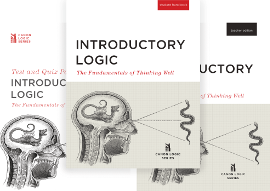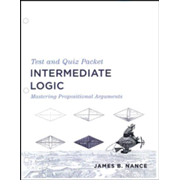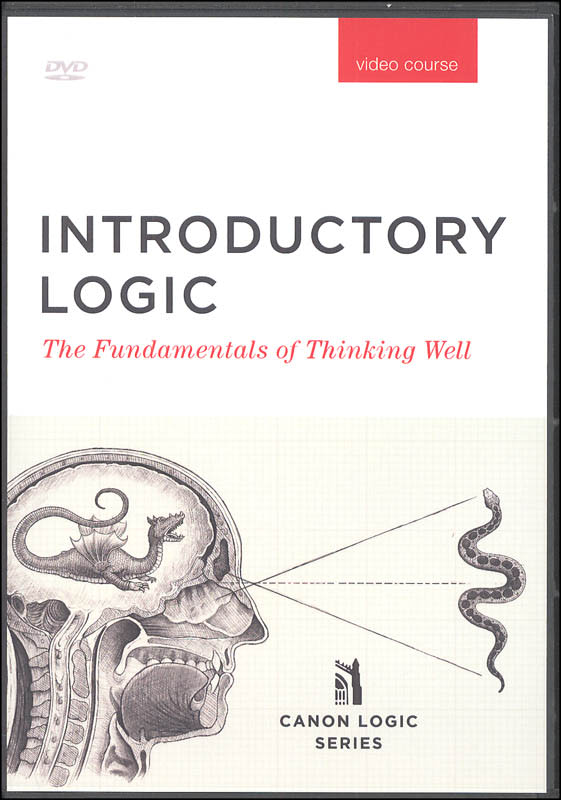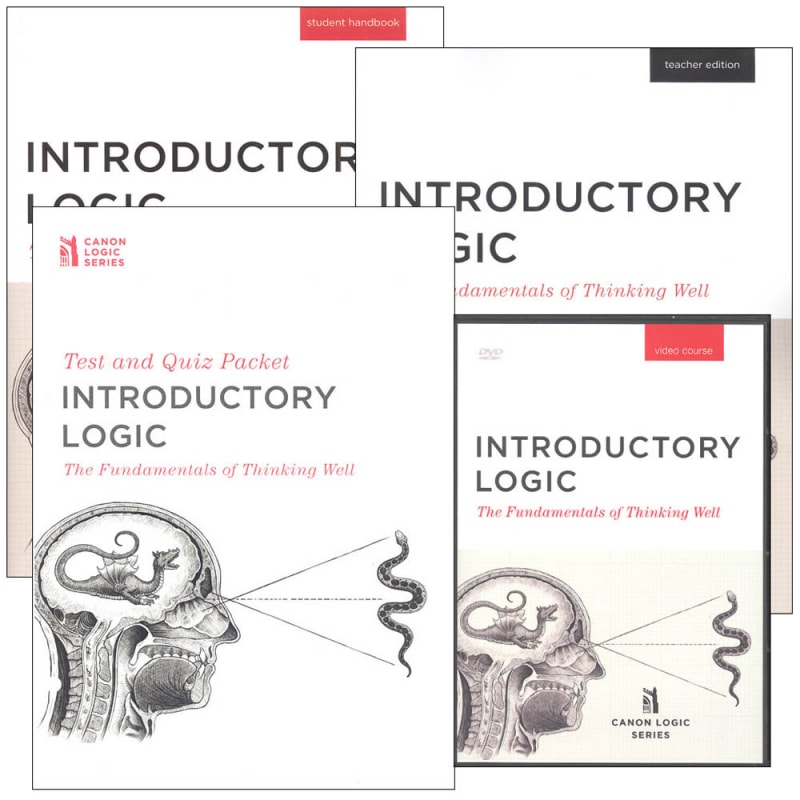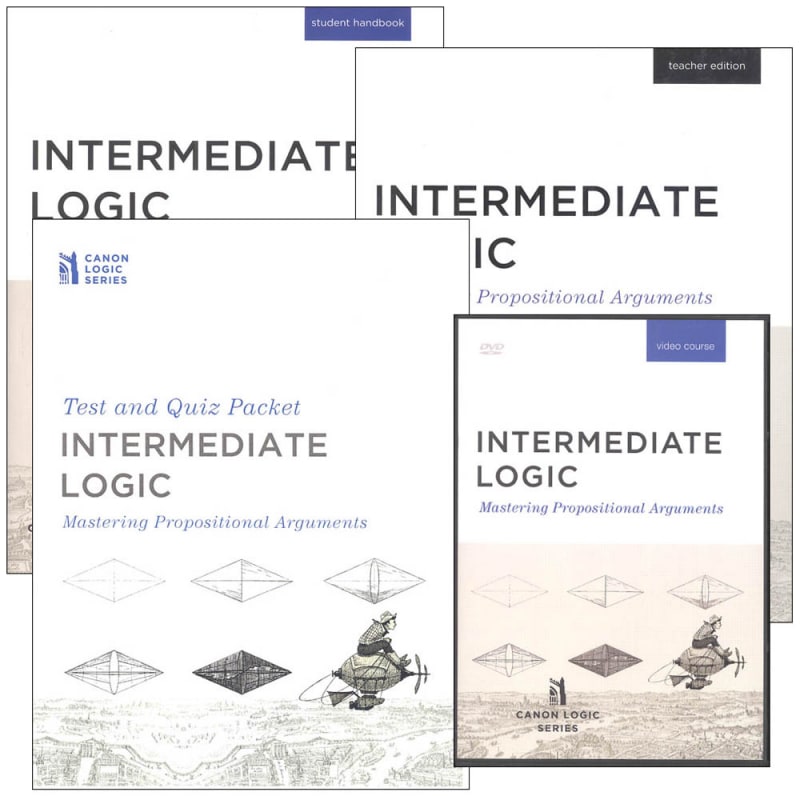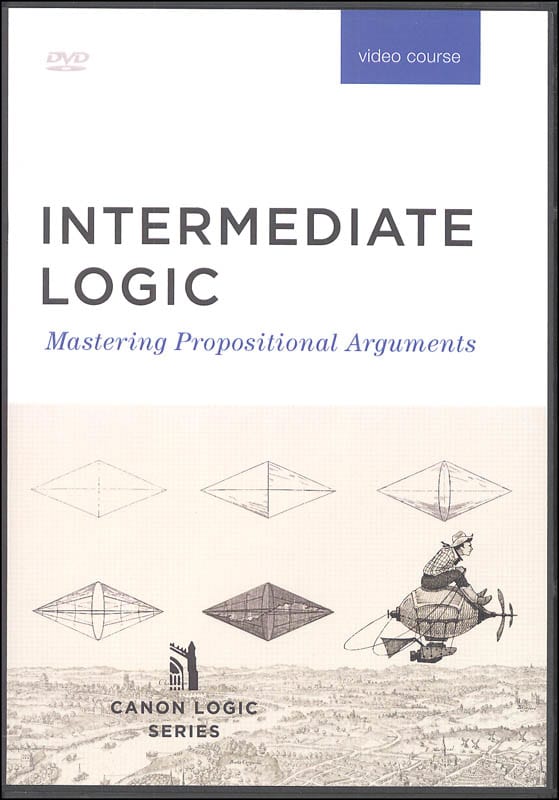Introductory Logic: The Fundamentals of Thinking Well (fifth edition) and Intermediate Logic: Mastering Propositional Arguments (third edition) might be used for students in grades eight through twelve. While students as young as eighth grade might study Introductory Logic, Intermediate Logic is definitely more challenging and should be best for high school students.
The latest editions of both courses have been significantly improved over earlier editions. Both courses are now easier for a teacher to present to a class group, and they are also easier for students to use working independently. In addition, Intermediate Logic has added 13 new lessons that help students practice applying what they have learned, and it introduces them to logic applications in the digital world.
Each course has a teacher edition, a student handbook, a test and quiz packet, and optional DVDs. The pages in the teacher edition are identical to those in the student handbook. However, in these new editions, the teacher's books have additional pages preceding each lesson that give teachers fully developed directions for presenting lessons to group classes. These directions include expanded explanations of new concepts, illustrations of concepts for presentation on a board, and interactive exercises that require a group. These pages also alert the instructor about the need to remind students about upcoming quizzes, and assignments. All of this makes it much easier to teach both courses.
Page layouts for the lessons in both teacher and student books include sidebars with definitions, key points, cautions, suggestions for further study, activities for thinking deeper, and historical information.
Exercises are included in both student and teacher books, and answers are overprinted on the exercises in the teacher edition. There are lines and sufficient space for students to complete the exercises within the student handbook. Pages in the student handbook are perforated which should make it easy for students to remove exercise pages if they need to turn them in.
The separate packet of tests and quizzes for each course has quizzes for every few lessons, periodic tests, and a comprehensive exam. The tests and exams have both A and B versions so students can use one version as a practice test if needed. Review exercises at the end of each unit help prepare students for tests. Copies of the quizzes and tests with overprinted answers are in the teacher edition.
The set of four DVDs for each course features Brian Kohl teaching each lesson using graphics and illustrations. Kohl's teaching style is much more engaging than that of the teacher who taught these lessons in a previous set of DVDs. In these lively presentations, Kohl follows the same general outline as does the lesson presented in the coursebook, but the wording and examples are different. So students who watch the videos should also read the lesson in their student handbook. Kohl does not use the group class presentation techniques from the teacher edition; he is focused solely on the lesson content. Consequently, the DVDs are ideal for students working independently who benefit from having a teacher present the lessons. Students in a class situation could also watch the DVD lesson after their teacher uses the lesson presentation and activities from the teacher edition, but I think that students in a class are more likely to just read the material rather than watch Kohl's lesson presentation since the teacher should have already covered some of the same content.
Both courses show schedules for completing the course in either one or two semesters. Completing a course in one semester requires daily class sessions. That pace of learning is likely to be very challenging for most students, so I would generally recommend taking a year to complete each course.
The word "introductory" in the title of the first book makes it sound easier than it is. Introductory Logic is a challenging course for students who are willing to do some serious thinking. The book is divided into five sections: Terms and Definitions, Statements and Their Relationships, Syllogisms and Validity, Arguments in Normal English, and Informal Fallacies. While Introductory Logic primarily teaches informal logic, it also introduces some formal logic and a few of the symbols used as a shorthand method for writing logical statements.
Intermediate Logic is divided into five units: Truth Tables, Formal Proofs of Validity, Truth Trees, Applying the Tools to Arguments, and Digital Logic. In contrast to Introductory Logic, Intermediate Logic is entirely about formal logic, and it uses logical symbols throughout the course.
The new lessons added to this third edition of Intermediate Logic make up all of the fourth and fifth units. The fourth unit teaches a few new concepts, but it serves primarily as an opportunity for students to apply what they’ve learned as they work through excerpts from famous writings on theology and philosophy. The fifth unit is optional, but it offers students an opportunity to apply logic to the digital world as they work on the logic required for creating digital displays, the use of binary numbers, logic circuits, and other digital concepts.
The content of both courses clearly reflects a Christian perspective because of the frequent scriptural, religious, and theological examples. The content is intended to help students develop a Christian worldview as well as an ability to defend their faith. For example, in Intermediate Logic, Exercise 7a requires students to "Translate the arguments into symbolic form... and then use truth tables to determine their validity..." The argument in number 13 reads: "If Jesus is not God then He was a liar or He was insane. Jesus was clearly not a liar. He certainly was not insane. We conclude that Jesus is God.” (This is a simplified summary of an argument developed in the lesson.)
Summary
While these courses are challenging, the addition of instructional notes for teaching group classes and the new DVDs should help students learn the material more easily, whether a student learns alone or with others. The frequent reviews, quizzes, and tests help reinforce the lesson material and ensure that students don’t plow ahead without forming a solid foundation.





